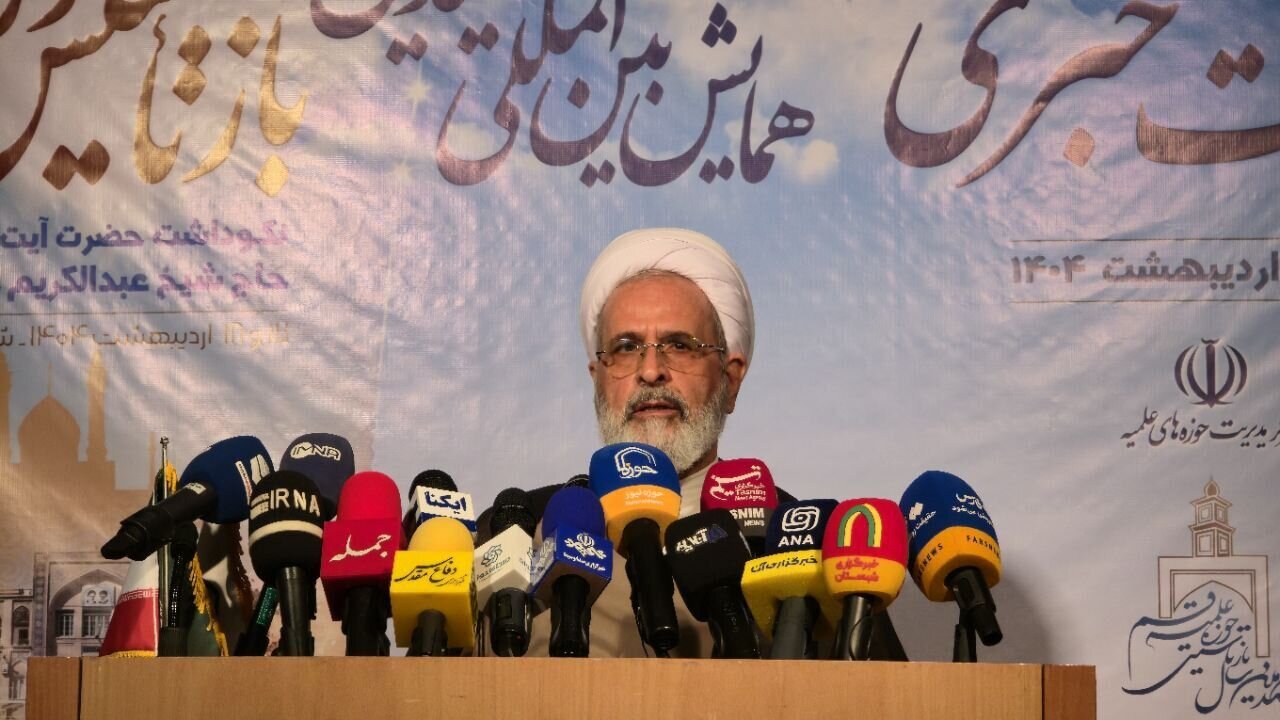Leader’s charter on clergy to mark turning point in seminary discourse, says senior cleric

TEHRAN – Ayatollah Alireza A’rafi, Director of Iran’s Islamic Seminaries, said the Leader of the Islamic Revolution Ayatollah Seyyed Ali Khamenei’s upcoming Charter on Clergy will mark a significant turning point in religious and academic developments, aligning with the legacy of the Founder of the Islamic Revolution Imam Khomeini’s original vision.
Speaking Sunday at a press conference ahead of the International Conference on the Centenary of the Re-establishment of the Qom Seminary, Ayatollah A’rafi outlined the pivotal role of seminaries in Iran and the broader Islamic world. The event was held at the Malek Museum in Tehran and attended by senior seminary officials and scholars.
Describing seminaries as knowledge-driven, ethical, and people-oriented institutions, A’rafi emphasized their historical role in promoting science, thought, and social engagement. “The seminary has a deep-rooted legacy,” he said, “and its network, extending from Iran to Iraq and beyond, has always worked to preserve its scholarly and religious identity.”
Ayatollah A’rafi identified four defining characteristics of Islamic seminaries: academic rigor, ethical leadership, social connection, and responsible political engagement. “In earlier eras, when seminaries and universities were not separate, all branches of science flourished in the seminary,” he noted, underscoring the institution’s intellectual heritage.
On the seminary’s social roots, A’rafi said: “The seminary is by the people and for the people. Serving society is its fundamental mission.”
He also lauded the seminary’s moderate political stance. “Seminaries have long stood firm against foreign interference and upheld the independence of Islamic nations,” he said, noting their critical role during the Islamic Revolution and other historic turning points.
He credited Imam Khomeini with spearheading the development of Islamic political thought and establishing a new model of governance—religious democracy—originating in Qom. “The ideas born here went on to shape major regional and global transformations,” he said.
A’rafi stressed that the seminary has expanded the reach of Islamic sciences in recent decades. “Today, our knowledge framework spans over 16 domains and 400 academic fields, including contemporary jurisprudence, comparative legal studies, and engagement with Western philosophy,” he said.
Ayatollah A’rafi also highlighted the growing role of women in Islamic scholarship. “For the first time since the Islamic Revolution, the doors of seminary education have opened widely to women,” he said, adding that around 500 women’s seminaries now operate across the country.
“The seminary’s reach is global,” he added, “with its teachings now present in over 100 countries.”
The upcoming international conference, scheduled for Wednesday, May 7, will feature speeches and messages from several senior religious authorities, including Ayatollah Javadi Amoli and Ayatollah Subhani. Video messages from Ayatollah Makarem Shirazi and Ayatollah Nouri Hamedani will also be presented, alongside international guests.
A’rafi announced that the Leader’s new charter on clergy will be unveiled during the event. “This document will shape the future of seminaries and renew the vision originally laid out by Imam Khomeini,” he said.
He concluded by urging scholars and academics to contribute ideas for the continued advancement of the seminary. “We must look to the future, address our shortcomings, and respond effectively to the evolving needs of society,” he said.
Leave a Comment